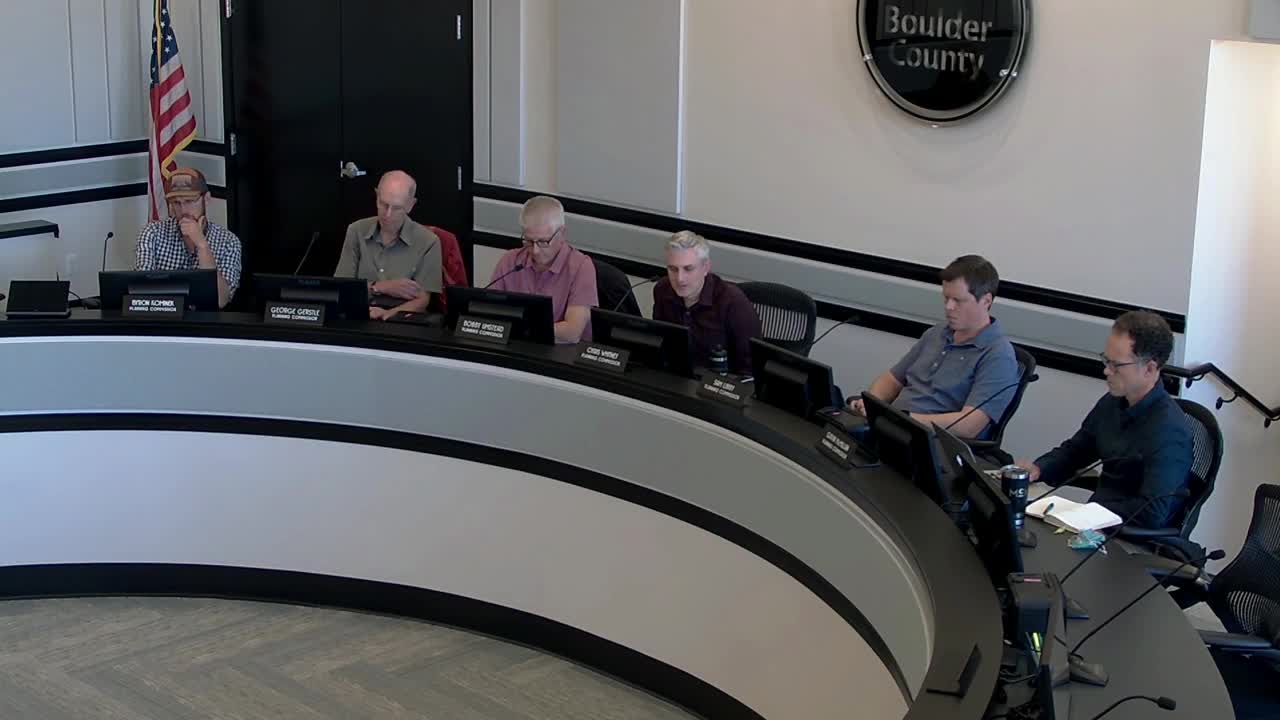Planning commission backs code change to treat state‑licensed group homes as households, but asks staff to retain a special‑review path for larger facilities
Get AI-powered insights, summaries, and transcripts
Subscribe
Summary
The Boulder County Planning Commission on Oct. 15 recommended that the Board of County Commissioners approve docket DC 24‑00004, a text amendment that would fold state‑licensed residential group homes into the county’s household definition and remove separate "boarding house" and "group care or foster home" uses from the land‑use code.
The Boulder County Planning Commission on Oct. 15 recommended that the Board of County Commissioners approve docket DC 24‑00004, a text amendment that would fold state‑licensed residential group homes into the county’s household definition and remove separate "boarding house" and "group care or foster home" uses from the land‑use code.
The amendment would make clear that state‑defined and licensed group homes — including homes for people with intellectual or developmental disabilities and for older adults — are "households" and may operate within any dwelling unit and be subject to the same occupancy limits as other households. Kaylee Byrne, a long‑range planner with Boulder County Community Planning and Permitting (CPP), said, "Group homes can, under the proposed regulations, operate within any dwelling and are subject to the same occupancy limits as any other dwelling." The commission voted unanimously to certify the docket and forward it to the Board of County Commissioners with additional direction to staff.
Why it matters: The amendment is intended to align the county code with federal fair‑housing law and Colorado state guidance that treat identified group homes as residential uses for zoning purposes. Byrne told commissioners the change responds to a prior code update that removed a "family" definition and introduced a new, occupancy‑based "household" definition; legacy references to "family" left the boarding house and group care definitions out of sync with the rest of the code.
What the change would do: Under the proposal, - the household definition would explicitly include group homes that are defined, licensed or certified by the state; - boarding house and group care/foster home uses would be struck from the code; and - smaller, residential‑scale group homes that meet the dwelling‑unit occupancy standards would be treated as households by right. Byrne explained that the code ties household size to dwelling‑unit standards (bedroom sizes, on‑site wastewater sizing if applicable, and an overall upper threshold of 16 residents drawn from building‑code distinctions).
Numbers and existing places: Staff told the commission there are four active approved group care/foster homes in the unincorporated county: Rose House, Ross Group Care Home, Mountain States Children's Home and Sandstone Care Residential at the Alps. Byrne said Rose House and Ross Group Care Home would likely fit the household/dwelling‑unit definition under the proposed text; Mountain States Children's Home and Sandstone Care Residential would become nonconforming uses and therefore could continue under the county's nonconforming‑use rules but would not be eligible for expansion beyond previously approved terms.
Public comment and concern: Nick Mears of Mountain States Children's Home raised concerns at public comment about the nonconforming designation. "Our major concern is how this change will now make Mountain State's Children's Home labeled as nonconforming use," Mears said, saying that the organization has served children and families in the community for more than 65 years and worries about limits on future growth.
Commissioners' direction to staff: Commissioners pressed staff on how the code would distinguish a household in a single dwelling unit from larger campus‑scale group facilities and on whether there could be a process that permits larger group care settings through special review. Kim Sanchez, deputy director of CPP, told the commission staff had discussed potential options, including "making an exception writing into the code that existing... group homes that had been approved by the Board of County Commissioners would not be considered nonconforming," and that staff could return with options. Commissioners asked staff to present pathways that would allow existing sites to continue to operate and — in limited circumstances — permit future larger group residential uses to be considered through special review rather than being made ineligible by the household definition.
Formal action: The Planning Commission certified DC 24‑00004 for action by the Board of County Commissioners and recommended approval, with the explicit directions that staff (1) clarify wording (for example changing a confusing reference to "single dwelling unit" to read "one dwelling unit" in the household definition) and (2) return options for preserving a path for existing and future larger‑scale group residential uses to be reviewed by special use or a comparable process. The recommendation passed unanimously by roll call vote (yes: Sam Libby; George Christo; Gavin McMillan; Rachel Lee; Bobby Umstead; Byron Kromnick; Chris Whitney).
Next steps: The docket will move to the Board of County Commissioners for a decision; the planning commission certified the official record (staff materials, public testimony and its discussion) for that hearing.
Ending note: Staff said the amendment is intended to reduce regulatory distinctions tied to relationships (the old "family" definition) and to focus occupancy on health‑and‑safety standards. Commissioners asked for clearer drafting and asked staff to return with options to address the two existing sites that would become nonconforming under the current draft and to consider whether a special‑review path should remain available for larger or campus‑scale group residential facilities in the unincorporated county.
